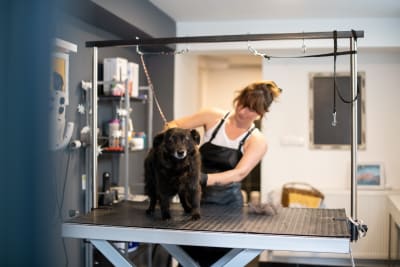To become a veterinarian in Ohio, you must be willing to spend a great deal of time acquiring the skills and expertise needed to succeed on the job.
Receiving your Doctor of Veterinary Medicine degree is just one of a handful of steps that you have to follow to ensure that you’re in good standing not only with local veterinary bodies but also with state and federal laws.
In case all of this sounds overwhelming, we assure you that it is not. To make the process much smoother and more straightforward, below is a comprehensive guide containing everything you need to know to start a successful veterinary career in Ohio.
How to Become a Veterinarian in Ohio
Aspiring veterinarians in Ohio may follow the process below to start their careers.
Starting from High School
The journey to become a veterinarian in Ohio starts by preparing since high school. Individuals do this by focusing on relevant subjects such as biology, mathematics, physics, and chemistry.
Enrolling in a Degree Program
Before entering veterinary school, candidates must earn a degree in a relevant field. Some veterinary schools prepare guidelines outlining accepted undergraduate majors, while some don’t.
Generally, going with animal science-related fields is a great way to increase chances of acceptance. Candidates may also participate in community service, take up business and communication classes, and work towards receiving letters of recommendation to increase their chances of securing admission into a vet school.
Veterinary School
The most important thing to consider when choosing a veterinary school is to enroll in one accredited by the American Veterinary Medical Association’s Council on Education.
There are significantly more students seeking admission into these schools than the number of available positions. For this reason, the competition is usually high.
Those who successfully secure admission may look forward to classes in animal physiology, pathology, ophthalmology, parasitology, and pharmacology, among others. Hands-on experience is also obtained through working in real-world practices.
Veterinary License
In Ohio and nationwide, aspiring veterinarians must pass the North American Veterinary Licensing Examination. While they have the luxury to do this at any time, candidates tend to sit for the exam just before they graduate from veterinary school.
It should be noted that this license is different from the state license that varies from one state to another. We will discuss more on the issue of veterinary licensing in Ohio in the upcoming section.
Specialization
Lastly, once they have enough experience to make an optimal decision, veterinarians in Ohio may choose to specialize and obtain certification. An area of specialization that is becoming more popular in recent years is the field of exotic animal veterinary medicine.
Explore other careers with similar paths:
Top Veterinary Schools in Ohio
Below are some of the most notable veterinary schools for interested applicants in Ohio to consider.
The Ohio State University
Columbus, OH Online + Campus
The Ohio State University in Columbus is the only accredited veterinary college in the state. The school admits 165 new veterinary students yearly, with competition increasing significantly.
Tuition
$12,485 - $37,437Contact
(614) 292-1171
CVM-DVMAdmissions@osu.edu
Additional Alternatives
Candidates looking for additional alternatives may consider enrolling in accredited programs offered by colleges in neighboring states. For instance, Pennsylvania has an accredited veterinary program from the University of Pennsylvania in Philadelphia.
Candidates may also consider the veterinary program offered by Purdue University in Indiana.
Explore more veterinarian schools in neighboring states:
Licensure & Certification Requirements
As mentioned above, veterinarians in Ohio must graduate from a veterinary college, earn a Doctor of Veterinary Medicine degree, and pass the North American Veterinary Licensing Exam.
These are the general requirements that everyone adopts, but peculiar to the state of Ohio are the licensing fees and the continuing education requirements.
Currently, veterinarians looking to register with the state must pay a fee of $425 every even-numbered year and $300 every odd-numbered year. They must also pay an application fee of $3.50.
Renewal must be done every two years by paying the appropriate fee and completing 30 hours of continuing education. The state also provides a temporary license that costs $100 and a $3.5 application fee.
Salary & Career Outlook
Veterinarians in Ohio earn an annual average salary of $113,127. Those who have successfully optimized factors such as experience, location, specialization, and establishment of employment may make more than this number at an annual average salary of $164,11.
Of course, those on the bottom end of these factors may also earn less, with an annual average salary of around $77,980.
Sorting by location alone, veterinarians in Westerville are the highest paid in Ohio. They earn an annual average salary of $152,263.
Veterinarians follow them in Wooster with an annual average salary of $133,765. Cincinnati, Brunswick, and Northridge round up the top 5 highest paying cities for veterinarians in Ohio, with average yearly salaries of $130,482, $119,107, and $116,417 $respectively.





